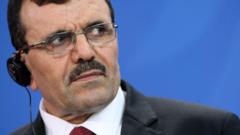A Tunisian court has handed down a staggering 34-year prison sentence to former Prime Minister Ali Laarayedh on multiple terrorism-related charges. This ruling comes in the wake of a broader campaign against critics of President Kais Saied, with rights organizations decrying the judicial process as a farce. Laarayedh, 69, a key political figure and leader of the moderate Islamist Ennahda party, stands accused alongside seven others of establishing a terrorist cell and facilitating travel for Tunisian youths seeking to join combatants in Iraq and Syria. In a defiant letter, he declared his innocence, stating, "I am not a criminal... I am a victim in this case."
Former Tunisian Prime Minister Sentenced to 34 Years on Terrorism Charges

Former Tunisian Prime Minister Sentenced to 34 Years on Terrorism Charges
Ali Laarayedh's conviction is seen by many as an extension of President Kais Saied's crackdown on political dissent.
The charges against Laarayedh reflect ongoing tensions in Tunisian politics, particularly after Saied's 2021 dissolution of parliament and subsequent consolidation of power. Rights advocates assert that recent imprisonments, which include diplomats, lawyers, and journalists, reveal Saied's increasing authoritarian stance. Human Rights Watch has called Laarayedh's ordeal one instance of Saied's attempts to undermine political opponents and suppress dissent by labeling them as terrorists.
While former leader Laarayedh's party, Ennahda, played a vital role in Tunisia's post-revolution governance following the Arab Spring uprising in 2011, many citizens now express disillusionment with the perceived erosion of the democratic advancements made during that period. Saied, however, has consistently rebuffed these critiques, framing his actions as necessary measures against "traitors" and responding to alleged "foreign interference."
For more insights into the ongoing political situation in Tunisia, follow us for real-time updates and analyses.
While former leader Laarayedh's party, Ennahda, played a vital role in Tunisia's post-revolution governance following the Arab Spring uprising in 2011, many citizens now express disillusionment with the perceived erosion of the democratic advancements made during that period. Saied, however, has consistently rebuffed these critiques, framing his actions as necessary measures against "traitors" and responding to alleged "foreign interference."
For more insights into the ongoing political situation in Tunisia, follow us for real-time updates and analyses.




















